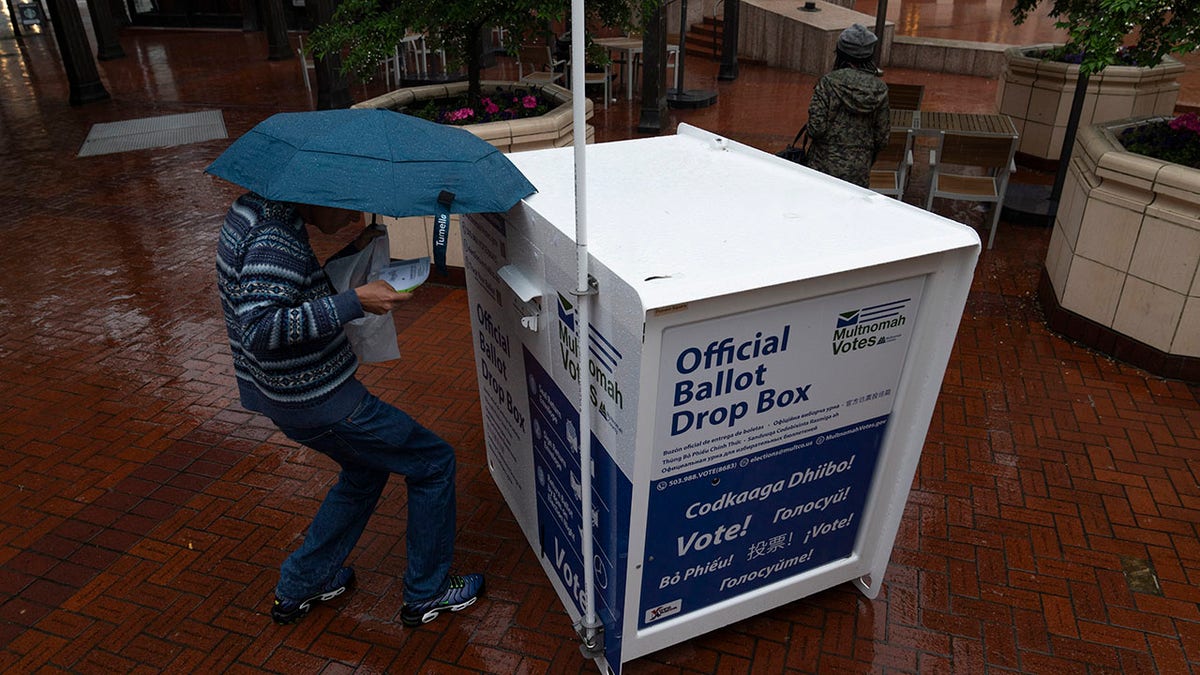Oregon
Oregon Is Trying to Catch a Wolf Killer

A federal agency wants information on the deaths of three endangered gray wolves in southern Oregon, and they have a hefty reward for good information. The US Fish and Wildlife Service is offering $50,000 for details that lead to an arrest, criminal conviction, or a fine of people involved in the deaths, reports CNN. The statement did not include details of how the wolves died, but it notes that two were “subadult” (older offspring) and one was a breeding female from the same Gearhart Mountain Pack. Seven wolves are believed to remain in that pack, one of which is a breeding male.
Officials were alerted of the deaths in late December because two of the wolves were wearing tracking collars that sent a mortality signal near the California-Oregon border. This fell in an area where the animals are protected under the Endangered Species Act—the western two-thirds of Oregon. KGW8 reports that these collars are trackable by GPS, and also have push notifications to help protect livestock when wolves are nearby. Recent counts estimate at least 178 wolves in Oregon in two dozen packs (though the number is likely higher). In 2022, 17 wolves were killed by humans, and seven of those deaths were illegal. Six killings were by the state or licensed ranchers for recurring attacks on livestock.
Gray wolves were once common in Oregon, until bounty programs nearly eradicated them by the mid-1900s. They were reintroduced in 1999 with strict protections, per BiologicalDiversity.org, and by 2011, the wolves were no longer under federal protection in the whole state. In Arizona, CBS News notes that a similar situation is playing out with the illegal killing of a bighorn sheep that was shot and left for dead in a field. Groups raised $6,500 to reward information leading to an arrest. “There is no justifiable reason to poach an animal during a closed season and leave it to waste,” said wildlife manager Travis Clarkson. “Poachers are not hunters or sportsmen; they are criminals who are stealing from the residents of Arizona.” (Oregon gray wolves were released in Colorado.)

Oregon
Republicans from eastern, southern Oregon choose different styles in Senate primaries • Oregon Capital Chronicle

Family members of two ousted Republican senators will take their place in the Oregon Senate next year after primary elections that saw hardline conservatives win in southern Oregon and more pragmatic Republicans prevail in eastern Oregon.
No Democrats running for the Senate faced primary challenges this year, but Republicans had several open seats because of retirements and a law that barred most sitting GOP senators from running for reelection because they participated in a six-week walkout in 2023.
Sen. David Brock Smith, R-Port Orford, beat back claims that he wasn’t conservative enough to prevail in a four-way primary in the 1st Senate District, which includes the southern coast. Beatty Sen. Dennis Linthicum’s wife, Diane, and Cave Junction Sen. Art Robinson’s son Noah won their primaries in the adjacent 2nd and 28th districts in southern Oregon, and both are expected to continue their family members’ streaks of strident opposition to almost every bill in Salem.
Meanwhile, former House Republican Leader Mike McLane and Wallowa County rancher Todd Nash handily won primaries in sprawling districts in eastern Oregon. Both indicated they want to work with other legislators to pass laws and bring funding back to their districts, rather than starting from a place of opposing every bill.
Bryan Iverson, a political consultant from central Oregon who formerly served as head of the Senate Republicans’ campaign arm and worked on state Rep. Christine Goodwin’s campaign against Robinson, said it’s hard to extrapolate much from primaries where only a quarter of registered voters turned out, but that there seemed to be a different tone among Republican primary voters in southern Oregon who preferred “obstructionist” candidates to the more “mainstream Republicans” who dominate eastern Oregon.
“In the Republican primaries, at least in southern Oregon, you see victories by the same hard-right-leaning candidates and not the everyday Republicans,” he said.
The Republicans who won contested primaries on Tuesday night represent safe districts and are all but certain to serve in January in the Senate, where Democrats now have a four-seat majority. But Sen. Dick Anderson, R-Lincoln City, and Redmond school board member Michael Summers face tough general election races in the closely divided coastal 5th Senate District that Anderson now represents and the Democratic-leaning 27th Senate District in central Oregon that Summers is vying for, which is now represented by Sen Tim Knopp, R-Bend.
Senate Minority Leader Daniel Bonham of The Dalles said Republicans aren’t taking anything for granted in November.
“We clearly recognize, just going through numbers statewide, there are fewer Republicans than there are Democrats, period,” Bonham said. “Those districts certainly present challenges. I think our candidates are up for the challenge, but simultaneously, it’s going to take tremendous campaigns and spirited effort to get us across the finish line.”
1st District along the southern coast
Brock Smith beat back three challengers in a race rampant with false claims about his record. He sent cease-and-desist letters to supporters of opponent Todd Vaughn early in the campaign after they began sending mail and bought a billboard falsely accusing him of connections to the Chinese Communist Party.
Hours before the ballot return deadline, Vaughn’s campaign sued Brock Smith over mailers that described Vaughn as “too extreme, dishonest and has no experience,” which the lawsuit maintained was false because Vaughn “is honest, he is not extreme and he has experience.” Brock Smith’s campaign ads also described Vaughn as connected to a misinformation group and said he had been kicked out of the Douglas County Republican Central Committee.
Brock Smith won with nearly 57% of the vote, compared to about 29% for Vaughn, 9% for Paul Romero and 6% for Ashley Hicks. As of Wednesday afternoon, he said none of his opponents had conceded.
“I don’t think anyone has ever seen a campaign such as this, where this blatant misinformation continued to flow even though it was unfounded and disproven,” Brock Smith said.
He said he intends to continue his work in the Capitol, including trying to get more resources for preventing and fighting wildfires that have led to sky-high home insurance rates for Oregonians living near forests.
2nd District in southern Oregon
Noah Robinson, son of departing Sen. Art Robinson, R-Cave Junction, easily dispatched state Rep. Christine Goodwin, R-Canyonville, in the 2nd Senate District.

Noah Robinson is a familiar face around the Capitol – he has worked with his father for years, and during the past two legislative sessions as the elder Robinson’s health failed, Noah has consistently been by Art’s side on the Senate floor and in committee hearings.
Art Robinson has reliably been one of the most reliable “no” votes in the Senate, even on bills that otherwise have wide bipartisan support. Noah Robinson said he expects to follow in his father’s footsteps.
“There’s all this bipartisan stuff because of the deals, and voters don’t like that,” Robinson said. “So when you tell them that you’re against that, you’re gonna vote entirely from principle – obviously, you talk to the other side, try to make the bad bills less bad – but if the final product is something you don’t want, you vote against it, and that really appeals to the voters because that’s what they want.”
While Art Robinson split from the Republican caucus to form an Independent Caucus with Sen. Brian Boquist, a Dallas Republican who was registered with the Independent Party of Oregon for several years, Noah Robinson said he plans to stick with the Republican Caucus. Boquist was barred from running for reelection and is now the Republican nominee for state treasurer.
The 2nd Senate District includes Josephine and parts of Douglas and Jackson counties. Robinson’s strong support in Josephine County, which represented the bulk of ballots cast in the primary, pushed him to winning more than 60% of the vote districtwide.
Goodwin said she was “bummed” that she didn’t prevail, and that it was clear voters in Josephine County wanted a different brand of Republican. But she cautioned against the approach Robinson expects to take in Salem.
“The results in this election are clear,” she said. “Yet, Republicans must remember we cannot expect to succeed by refusing to engage and participate in the legislative process in Salem. My campaign team and I wish our Republican nominee the best and hope he can be an effective legislator.”
Iverson said Josephine County – or at least the Republicans in the area who showed up to vote – made it clear they wanted a different style of candidate.
“They want that brand of Republicans that are just obstructionist, basically,” Iverson said. “I think that they were pushing for that from the get-go, and if that’s obviously how it turned out. That’s not what Chris wanted to represent, she wanted to represent those people and have a different way of going about it than I think Noah would, but that’s not what the people wanted.”

28th District in southern Oregon
Dennis Linthicum of Beatty is now the Republican nominee for secretary of state, but his wife and chief of staff, Diane, plans to continue a seven-year tradition of Linthicums representing Klamath County in the state Senate.
Diane Linthicum, who beat Klamath County Commissioner Dave Henslee with nearly 60% of the vote, did not return a call Wednesday and has not responded to various requests for interviews throughout her campaign. Dennis Linthicum, likewise, has never responded to phone calls or emails from the Capital Chronicle.
Henslee, who will leave the commission in December, said he was disappointed but respects voters’ decision. He said he’s looking for a new way to serve his community, and that he doesn’t have high hopes that Linthicum will serve the district well.
“I think that the best predictor of the future is the past,” Henslee said. “She completely supports Dennis Linthicum’s voting record, and in my opinion, his voting record hasn’t benefited our district. I was running for people and for our district, and to try to move the needle and do some really positive things for District 28, and unfortunately, the voters didn’t see it the same way I did.”
29th District in northeast Oregon

Cattle rancher and Wallowa County Commissioner Todd Nash handily won a four-way primary to replace retiring Sen. Bill Hansell, R-Athena, in the 29th Senate District that covers most of northeast Oregon.
He captured about 53% of the vote, compared to about 25% for former Morrow County Commissioner Jim Doherty and 20% for Hermiston Mayor Dave Drotzmann. Eastern Oregon University student Andy Huwe came in a distant fourth with less than 2% of the vote.
Nash also might make Oregon history as the first senator to hail from Wallowa County – he isn’t aware of any others, but he’s willing to be proven wrong if any historians know of a former senator from Oregon’s most remote county.
He said he plans to meet with Republican senators, with county commissioners in the district and with natural resource groups including the Oregon Farm Bureau and the Oregon Cattlemen’s Association – which he previously led as president – to decide on legislation for next year.

30th District in eastern Oregon
Former House Republican Leader Mike McLane will head back to the Capitol after winning more than two-thirds of the vote in a three-way contest in the sprawling 30th Senate District. Retiring Sen. Lynn Findley, R-Vale, endorsed McLane, who was House GOP leader when Findley was first appointed as a state representative in 2018.
McLane left the state House in 2019 after eight years, six as leader of the Republican caucus, to serve as a circuit court judge in Crook and Jefferson counties. He returned to private practice as a lawyer in 2021.
McLane described himself as a pragmatist when it comes to legislation. As a lawmaker, he said he plans to participate and contribute to policy decisions in every way he can, and he plans to speak soon with both Bonham and Senate President Rob Wagner, D-Lake Oswego, about how he can help next year.
“Ultimately, the goal is to get something that works,” he said. “During my time as a judge, I saw in the courtroom the consequences of policy passed in Salem, and it just shaped in me a view that perfection is often the enemy of the good. I believe that voters in my district want their representatives in Salem to do their best and to work hard, but ultimately to advocate for their interests and for the betterment of our state.”
GET THE MORNING HEADLINES DELIVERED TO YOUR INBOX
Oregon
Progressive Oregon district attorney ousted by tough-on-crime challenger

A centrist district attorney candidate in Oregon has ousted his incumbent progressive opponent after running on a tough-on-crime platform.
Nathan Vasquez previously served as a deputy prosecutor to Multnomah County District Attorney Mike Schmidt. Vasquez won Tuesday’s nonpartisan primary election after returns showed him receiving more than 50% of the vote.
Vasquez, who was endorsed by several police groups, said Schmidt conceded the election during a Wednesday phone call. He was a prosecutor in the DA’s office for more than 20 years.
“I want to thank him for his professionalism and service to our community,” Vasquez said in a post on his campaign Facebook page. “I look forward to working with my colleagues in the DA’s office, with community partners, and with the public to help build a safer Multnomah County for all of us.”
SUSPECTED PORTLAND SERIAL KILLER HAD TRIED TO CHOKE POLICE K-9, WAS RELEASED FROM PRISON EARLY: REPORT
Nathan Vasquez, left, has ousted Multnomah County District Attorney Mike Schmidt in Oregon. (Vasquez for DA; Getty Images)
Schmidt came into office days before the police killing of George Floyd in Minnesota and the calls for changes to the criminal justice system that came amid racial justice protests in Portland and other cities nationwide. Other DAs ushered into office in liberal bastions like San Francisco and Seattle around the same time have since faced setbacks amid frustrations from the public over crime.
Generally, those district attorneys have supported finding alternatives to imprisonment and have refrained from prosecuting low-level crimes to reduce incarceration rates and address social inequities in the criminal justice system.
Critics have said such policies enable criminals and public safety risks.
PORTLAND SERIAL KILLER FEARS: VICTIMS’ PARENTS SPEAK OUT AFTER ‘CAREER CRIMINAL’ NAMED PERSON OF INTEREST

Portland, Ore., right, one of the most reliably blue cities in the U.S., has ousted its incumbent district attorney, Mike Schmidt, left, with a former Republican in Nathan Vasquez [not pictured]. (Getty Images)
Shortly after taking office, racial justice demonstrations gripped Portland as chaos erupted on the streets nearly every night for months. Schmidt announced that his office wouldn’t prosecute protesters unless they were arrested for deliberate property damage, theft, or the use or threat of force against another person. Interfering with a police officer, disorderly conduct and criminal trespass were cited as examples of cases his office would decline.
Vasquez announced the policy, as well as Schmidt’s support for a 2020 voter-approved measure that decriminalized the possession of small amounts of drugs. Earlier this year, state lawmakers rolled back the law and restored criminal penalties for so-called “personal use” possession amid one of the nation’s largest spikes in overdose fatalities.
Schmidt supported the move.

A person drops off their vote-by-mail ballot at a dropbox in Pioneer Square during primary voting in Portland, Ore. (AP Photo/Jenny Kane)
CLICK HERE TO GET THE FOX NEWS APP
In his message, Vasquez said he was “committed to ending open-air drug dealing and drug use while helping connect individuals to treatment, to rebuilding the broken relationships between the DA’s office and the community, and to ensuring that victims are the number one priority of my office.”
Fox News Digital has reached out to Schmidt’s campaign.
The Associated Press contributed to this report.
Oregon
Bend losing, Portland and Eugene winning: Large Oregon districts see mixed results from school levies

Ballots are processed at the Washington County Elections Office in Hillsboro, Ore., May 21, 2024.
Kristyna Wentz-Graff / OPB
Three of Oregon’s largest school districts had measures on the May ballot to either establish or renew levies in their communities.
Portland Public and Eugene appeared to have gotten a “yes” from voters. But others weren’t so lucky.
According to initial results this week, voters in the Bend-La Pine School District are rejecting a new tax levy that district leaders say is needed to maintain class sizes and staffing, add career technical education programs and more.
Bend-La Pine administrators warned voters before the election that if the levy didn’t pass, they’d have to eliminate up to 180 positions over the next two years, and average class sizes would likely increase by four students. They said counseling and support services would be stretched thin, and there would be a 30% reduction in building budgets.
Scott Maben, director of communications for the district, told OPB it’s too early to say if the school board will go back to voters any time soon.
“Superintendent [Steven] Cook will discuss the outcome of this election with the board at an upcoming board meeting,” he wrote in an email Wednesday, “possibly June 18.”
Maben said the district needs time to analyze the results of the election and listen to feedback from voters who did not support the levy request. He said there may be a variety of reasons it didn’t pass, and they want to look into that closely.
However, he acknowledged it wasn’t close. Results as of Wednesday morning showed about 57% of the votes cast were in opposition.
“That’s a clear message that voters are not in favor of adding a local option levy in our district at this time,” Maben said. “We certainly are disappointed in these results, as we believe the priorities we had identified for levy funding are important and deserving of additional investment.”
Local taxes have become a key source of funding for many Oregon schools. That’s especially important this year as districts across the region face tens of millions of dollars in budget deficits. Educators are losing their jobs, and in some cases, entire schools or districts are at risk of being closed.
It’s often easier for districts to renew existing levies — such as those in Portland and Eugene — than to introduce a new tax. In some parts of the state, passing taxes to support schools may fail repeatedly before a district is able to win the support of a majority of voters, as happened in the small Gervais district this election.
Maben said leaders in Bend-La Pine are also focusing their efforts on securing adequate state funding for the 2025-27 biennium.
“We are already deeply engaged in communicating with state leaders regarding the challenges of meeting the needs of our students with the current state of education funding in Oregon,” he wrote. “We will intensify these efforts as we approach the next legislative session.”
Maben said the future financial difficulties caused by the failed levy are separate from current budget conversations.
The school district has already built its proposed budget for the 2024-25 school year, which, like many districts across the state, reduces staffing and other spending. That budget will go to the school board next month for final approval.
The budget for the upcoming school year eliminates close to 60 positions across the district by eliminating vacant positions — rather than through layoffs. Maben said additional cuts may be necessary for the following 2025-26 school year as a result of the vote, but those conversations will be part of the budget process starting next January.
-

 Politics1 week ago
Politics1 week agoReports of Biden White House keeping 'sensitive' Hamas intel from Israel draws outrage
-

 World1 week ago
World1 week agoPro-Palestinian university students in the Netherlands uphold protest
-

 Politics1 week ago
Politics1 week agoSouthern border migrant encounters decrease slightly but gotaways still surge under Biden
-

 Politics1 week ago
Politics1 week agoDem newcomer aims for history with primary win over wealthy controversial congressman
-

 Politics1 week ago
Politics1 week agoWhite House walks diplomatic tightrope on Israel amid contradictory messaging: 'You can't have it both ways'
-

 World1 week ago
World1 week agoSlovakia PM Robert Fico in ‘very serious’ condition after being shot
-

 News1 week ago
News1 week agoDespite state bans, abortions nationwide are up, driven by telehealth
-

 World1 week ago
World1 week agoCanadian Nobel-winning author Alice Munro dies aged 92



















